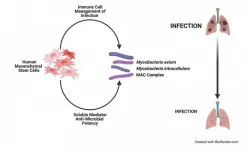(Press-News.org) University of South Australia researchers have identified an enzyme that may help to curb chronic kidney disease, which affects approximately 700 million people worldwide.
This enzyme, NEDD4-2, is critical for kidney health, says UniSA Centre for Cancer Biology scientist Dr Jantina Manning in a new paper published this month in Cell Death & Disease.
The early career researcher and her colleagues, including 2020 SA Scientist of the Year Professor Sharad Kumar, have shown in an animal study the correlation between a high salt diet, low levels of NEDD4-2 and advanced kidney disease.
While a high salt diet can exacerbate some forms of kidney disease, until now, researchers did not realise that NEDD4-2 plays a role in promoting this salt-induced kidney damage.
"We now know that both a high sodium diet and low NEDD4-2 levels promote renal disease progression, even in the absence of high blood pressure, which normally goes hand in hand with increased sodium," says Dr Manning.
NEDD4-2 regulates the pathway required for sodium reabsorption in the kidneys to ensure correct levels of salt are maintained. If the NEDD4-2 protein is reduced or inhibited, increased salt absorption can result in kidney damage.
Even people on a low salt diet can get kidney damage if they have low levels of NEDD4-2 due to genetic variations or mutations in the gene.
Prof Kumar says the long-term goal is to develop a drug that can increase NEDD4-2 levels in people with chronic kidney disease (CKD).
"We are now testing different strategies to make sure this protein is maintained at a normal level all the time for overall kidney health," Prof Kumar says.
"In diabetic nephropathy - a common cause of kidney disease - levels of NEDD4-2 are severely reduced. This is the case even when salt is not a factor."
The study also revealed a surprising finding: that the high salt diet induced kidney disease is not always due to high blood pressure.
"In a lot of cases, kidney disease is exacerbated by hypertension, so we wanted to investigate that link in our study. In fact, we found the complete opposite - that a high salt diet caused excessive water loss and low blood pressure. This is significant because it means that kidney disease can also happen in people who don't have high blood pressure," Dr Manning says.
A 2020 Lancet paper estimated that about 700 million people - or 10 per cent of the world's population - suffer from chronic kidney disease, which represents a 29 per cent increase in the past 30 years.
The huge spike in CKD is mainly attributed to a global obesity epidemic in recent decades, leading to diabetes, one of the leading causes of chronic kidney disease along with high blood pressure.
World Health Organization statistics reveal a 300 per cent increase in diabetes between 1980 and 2014, making it one of the top 10 causes of death worldwide and showing the gravity of the problem facing scientists trying to tackle kidney disease.
"Obesity and lifestyle are two main factors driving chronic kidney disease but there are other things at play as well," says Dr Manning. "Acute kidney injuries, drugs taken for other conditions, high blood pressure and a genetic predisposition can also cause it."
INFORMATION:
The UniSA scientists are collaborating with clinicians from the Royal Adelaide Hospital and Flinders Medical Centre and hope to secure funding to take their research to the next stage - to find a way to regulate NEDD4-2 and protect against kidney disease.
A video featuring Dr Jantina Manning explaining the findings can be found at:
https://youtu.be/Szi0YW0-ZdU
Pioneering neural recordings in patients with Parkinson's disease by UC San Francisco scientists lays the groundwork for personalized brain stimulation to treat Parkinson's and other neurological disorders.
In a study published May 3rd in Nature Biotechnology, UCSF Weill Institute for Neurosciences researchers implanted novel neurostimulation devices that monitor brain activity for many months, with and without deep brain stimulation (DBS) therapy. Pairing the brain recordings with wearable monitors of movement, they identified patterns of brain activity corresponding to specific movement abnormalities associated with Parkinson's. Their research provides the first ...
HOUSTON - Researchers have found the right formula for mixing a cement that does double duty as a structural material and a passive photocatalytic water purifier with a built-in means of replenishment: simply sand down the material's surface to refresh the photocatalytic quality.
They found this recipe using a few very precise physical laboratory experiments whose data were then greatly amplified using a computational method called combinatorics that tested thousands of combinations of cement composites and their photocatalytic qualities.
The results, say the researchers from C-Crete Technologies and Rice University, indicate ...
Blood may seem like a simple fluid, but its chemistry is complex. When too much potassium, for instance, accumulates in the bloodstream, patients may experience deadly irregular heart rhythms.
Cardiovascular scientists at Virginia Tech's Fralin Biomedical Research Institute at VTC are studying why.
In a new study, published in Pflügers Archiv European Journal of Physiology, the research team led by Steven Poelzing, associate professor at the institute, describes how subtle changes in potassium, calcium, and sodium levels regulate heartbeats.
Poelzing ...
DALLAS (May 3, 2021) - Researchers from the Center for BrainHealth® at The University of Texas at Dallas are investigating a potential new early indicator of the decline toward Alzheimer's disease: measuring the energy metabolism of the living human brain using cutting-edge imaging techniques.
The scientists devised a unique way to illustrate energy consumption and reserves in the brain with phosphorus magnetic resonance spectroscopy using an ultra-high-field 7 Tesla MRI scanner. Their results suggest that neurological energy metabolism might be compromised in mild cognitive impairment (MCI), the stage of decline between healthy ...
A study published today in Nature Communications shows that the drug rucaparib has been effective in treating certain types of ovarian cancers if used early in treatment, after a diagnosis, and before the cancer cells build up a resistance to chemotherapy.
Rucaparib is in a relatively new class of drugs - Poly(ADP-ribose) polymerase or PARP inhibitors - which have been approved for therapy in ovarian cancers. This study provides insights into both how the cancers resist treatments, and which patients may respond favorably to the drug, said lead author Dr. Elizabeth Swisher, a UW Medicine ...
Durham, NC - A study released today in STEM CELLS Translational Medicine offers hope for those suffering from a chronic, difficult to treat condition called non-tuberculous mycobacteria (NTM) lung infection. The study describes how researchers at Case Western University developed a new model of NTM lung infection and then used it to show how effective human mesenchymal stem cells (hMSCs) are in treating this condition - and even which donor cells might be best for doing so.
"The potential to use human mesenchymal stem cells to treat difficult lung infections is promising," said Anthony Atala, M.D., Editor-in-Chief of STEM ...
PULLMAN, Wash. -- Professor Arda Gozen looks to a future someday in which doctors can hit a button to print out a scaffold on their 3-D printers and create custom-made replacement skin, cartilage, or other tissue for their patients.
Gozen, George and Joan Berry associate professor in the Washington State University School of Mechanical and Materials Engineering, and a team of researchers have developed a unique scaffolding material for engineered tissues that can be fine-tuned for the tricky business of growing natural tissue. They report on their research in the journal, Bioprinting. The team also includes researchers from WSU's ...
Dating violence - physical, sexual, psychological or emotional within a relationship, including stalking - is pervasive on college campuses with far-reaching health implications. One in five women experience a sexual assault in college and students living in sorority houses are three times more likely to experience rape. College students are vulnerable to dating violence because of the influence of their social and living environments.
Researchers from Florida Atlantic University's College of Education in collaboration with Sacred Heart University conducted a study to understand the dating violence experience and perpetration of college-age women, ...
Astronomers have identified more than 4,000, and counting, confirmed exoplanets -- planets orbiting stars other than the sun -- but only a fraction have the potential to sustain life.
Now, new research from UBC's Okanagan campus is using the geology of early planet formation to help identify those that may be capable of supporting life.
"The discovery of any planet is pretty exciting, but almost everyone wants to know if there are smaller Earth-like planets with iron cores," says Dr. Brendan Dyck, assistant professor of geology in the Irving K. Barber Faculty of Science and lead author on the study.
"We typically hope to find these planets in the so-called 'goldilocks' or habitable ...
Researchers at the University of North Carolina at Chapel Hill and Duke University improved HIV care by gamifying it with a mobile gaming application.
Gaming features - like those used to drive airline loyalty and track daily steps --- helped young men living with HIV achieve viral suppression and doubled their chances for reaching near perfect adherence to medication plans, according to a study in AIDS and Behavior.
Gamification can inspire changes in behavior when a doctor's advice or a patient's good intentions are not enough. In this case, motivating those living with HIV to stick to ...






